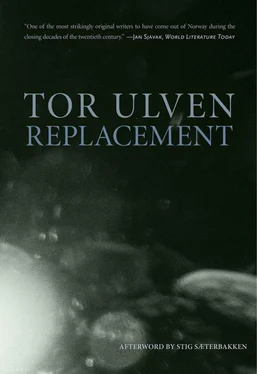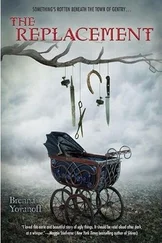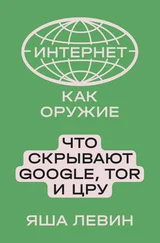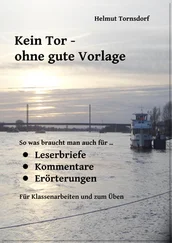These pleasurable thoughts keep you occupied, and the pictures you paint for yourself grow steadily more detailed, and this goes on for a while, or at least for several minutes, until you’re brought up short by the unpleasant fact that you’re a crippled old man no one wants, that you can’t just hop out of bed and conquer the world, that it’s too late, definitely too late to begin a new life, that you’ll never have enough money to do what you want, that not even the loosest nurse at the assisted living facility would let you grope her; and the more you think about it, the more you realize that your prospective, newly won freedom is useless, as worthless as a lottery ticket that’s managed to miss the jackpot by a single number (and it hits you that, in practical terms, that’s true of every lottery: someone out there is holding a ticket that’s only one number away from the jackpot, neither more nor less than that, all the other numbers match except for the number that, for example, should’ve been a four instead of a three, and so the ticket (the one ending in three) is as worthless as any other ticket, is as worthless as a ticket that missed the jackpot by five thousand and sixty-nine, for example).
You’re lying there in bed. Is the maid coming by today or tomorrow? You can’t remember. The telephone is out of reach. The wheelchair is out of reach. The toilet is out of reach. Within reach, however, are words, fragments, such as berth, spicy, every Tues., fine cuisine, all-you-can-eat buffet, special offer, the number to call, w/rice, salad, and sauce, 1:00 p.m., boa constrictor ; these and others like them have been carefully glued to a purple background, a collection of torn, crumpled pieces of newspaper arranged almost (but not entirely) by chance on a piece of purple cardboard; the collage by your little grandnephew, who hasn’t learned to read yet, hangs beside your bed, a series of random fragments literally ripped out of their contexts, sometimes in direct opposition to a given word’s meaning, also words like Indian food , though he, the child who can’t read, is ignorant of the many Hindu gods, Shiva, Vishnu, Ganesha, Devi, Krishna, Rama, Kali (the two-faced goddess: merciful, loving mother on the one hand, and the terrifying destroyer who likes to dance on skulls on the other), of karma and metempsychosis; to your grandnephew, you think, all these signs, all these letters and numbers are still charged with a vague, childish sense of wonder, a magical kind of eminence; he also can’t read words like burning hate and evil (and even if he could read them, he wouldn’t understand them), because these words, you think, have come to rest where they are (on a purple piece of cardboard) thanks to nothing more than blind, analphabetic chance, right now they’re just raw material, and it’s only after many years have passed that your grandnephew will be able to understand their significance, that he’ll be able to look back on his creation (if it even still exists) and discover a meaning there that wasn’t his own.
You’re lying there in bed. You can turn the reading lamp on or off. What’s the point of that, you wonder, amused. You turn it off. You want to see if a hint of daylight is coming in through the curtains yet. Nope. You turn the lamp on again. But was there a ghost of winter light there after all? You’re not sure. You turn the lamp off again. You try to give your pupils (which have contracted against the bright glare) the chance to adjust to this (potential) new, weak light source, which is circular and vaulted (gleaming in the center of a well-nigh indestructible cupola), topped by a piece of fancy brass-work, whose small, black shadow, circular like the original, makes it look like a busted fish eye about two meters in diameter, and marching in radial lines out from the pupil’s center are the dark shapes of stones, organized like game pieces in their opening position, and the whole thing, in fact, resembles a game board, a roulette table, the gemstones are the lines extending from the rotating center, and the brass-work overhead is the wheel of fortune’s shiny hub.
The installation, indirectly lit by pseudo-mystical lighting leaking out from beneath the wide, polished wooden rim, which hugs the circle’s outer edge, is of course immobile, all that’s moving, a movement you can observe from your vantage point on the second floor, are the Sunday visitors, who stroll leisurely around, occasionally bending down to inspect the gemstones (like they’re genuflecting), some with noses actually pressed to the glass, others not, and read the labels, where each mineral’s more or less exotic-sounding, Latinate name is printed. From your position against the guardrail, you can see (with your one good eye) what seems to be a young man with a shiny bald spot right in the middle of his head (the prehistoric man’s fossilized skull has a large dent, or rather crater, about the size of an egg in the center of his forehead (presumably a mortal wound, possibly made by a hurled rock), and in the explanatory text at his side, the superfluous “g” at the end of Cro-magnong has been awkwardly crossed out with red ink), and you watch how small groups form around the installation, until every once in a while the whole thing is surrounded, as if the visitors are gathered around a conference table, except that most voices have been lowered to respectful whispers in the museum’s stillness (a modern skull, placed there for the sake of comparison, has no visible wound, it’s not fossilized, so it’s much whiter than the other, and the low pedestal simply says HUMAN).
An exit as big as a cathedral door, as if in homage to the venerability of knowledge. You can (with your one good eye) see that a few blue and yellow and white flowers, probably crocuses, have shot up from the earth around the south wall, and you blink in the late winter, early spring light and think that the museum hasn’t changed all that much since your last visit here (which must’ve been about twenty years ago): the same dark green linoleum, the same showcases of brown, polished wood, the same burlap background setting off the objects, as if the museum were a museum showcasing museumness. The botanical gardens out front are completely buried in snow. Not here, but across the street. Trailers with satellite dishes on their roofs, you can hear music broken by the sound of voices coming from one open window. You smell motor oil and grilled hotdogs. Entrance is free. Your indifferent eye glides over the attractions, which are gathered in a ring around the parking lot: an arcade, a carousel (the slow, old-fashioned kind with painted wooden horses), tossing and shooting games, keno booths, bumper cars, a carousel (the fast, modern, hydraulic version with gondolas shaped like spaceships that bob up and down as they go round and round), a Ferris wheel, and more, together with stalls offering roasted almonds, cotton candy, etc. You meander through the thin, periodically jostling crowd, beneath a light blue sky, only half-dressed in their winter gear, armed with thin jackets and thick boots, that is, but without the gloves, hats, and scarves, most are ten-year-old kids and preteens, along with small children who’ve got their parents in tow, all bearing the indefinite, unmistakable aura of the city’s east side, where the fair has just opened for the season, and you can’t help but wonder at the fact that it’s such a short way (right across the street) from the museum’s half-darkness, the twilit stillness of antiquity, to the amusement park out here in the spring sun.
The creak of the carousel, the clatter of falling tin pyramids, the music from the keno booths, the whining of the bumper cars, the thud of their collisions, the simulated battle sounds coming from the arcade, the sharp cracks from the shooting stalls, the creak and rattle of the Ferris wheel, the scraping of feet across the sand and gravel parking lot, the shrieks and howls of laughter, the sudden exclamations, the shouting of names or warnings, the children crying, the coughs, conversations, mutterings; all these sounds, you think, rising toward a calm, chilly, light blue sky, which is lightly covered by thin, white wisps of cloud (pale ones, which aren’t yet cottony, summery cirrus clouds against a bright blue sky); but nonetheless, you detect a sense of moderation and decorum in this recreational din, it’s nothing but a modest Sunday racket with no desire to boil over into Dionysian licentiousness or become an orgiastic synthesis of divine madness and ecstasy. None at all.
Читать дальше












